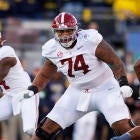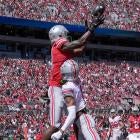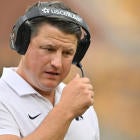Tom Jurich's suffering is still evident.
"Worst day of my life," the Louisville athletic director recalled.
Five years ago next month, Jurich and his athletic program became one of the biggest losers in the last big conference realignment merry-go-round. The Big 12 chose West Virginia over Louisville to get itself to 10 schools following the losses of Colorado, Missouri, Nebraska and Texas A&M in that realignment upheaval.
Jurich isn't the only one still wondering why Louisville was left out. The decision between the two schools involved three outside consultants, two powerful sports networks and politicking from state senators.
Then and now, the conclusion remains the same for some who remember the process: Louisville should have been the pick by the Big 12.
"It was severe. It was heartbreaking. I thought we belonged," Jurich said.
Louisville had the bigger market, better basketball program and more convenient airport. But West Virginia was on a roll, coming off a Final Four and -- in the moment -- with a better football pedigree.
The main difference was West Virginia being a state flagship that looked a lot like the Big 12's only three land grant universities -- Kansas State, Iowa State and Oklahoma State.
"At that point in time, it was close," said Chuck Neinas, the Big 12's interim commissioner at the time. "West Virginia won by a neck. Louisville wasn't then where they are now."
That would be ranked No. 3 heading to No. 5 Clemson for what might be the second-biggest game in school history. That's because the 63-20 win over Florida State two weeks ago was the biggest in the Cardinals' history.
All of it is possible because Louisville found a home in the ACC in 2012 -- 13 months after it was left out of the Big 12. Meanwhile, the Big 12 has found a certain amount of awkwardness with its choice, West Virginia.
The conference is exploring expansion, in part, because the Mountaineers need a travel partner. They are 860 miles away from their nearest Big 12 partner, Iowa State.
What's left is the Big 12 picking through much of the same inventory from 2011 in this round of expansion. That time the league had to expand or risk a severe alteration to its television contract with ESPN and Fox.
This time, expansion is an option. But once again, the question of what the right thing to do hangs in the air.
If the Big 12 expands, it will likely pick from a group of favorites that includes Houston, Cincinnati, UConn, BYU, South Florida and UCF. There is at least a 50 percent chance, though, the Big 12 does nothing and stands pat, CBS Sports has learned.
"We've come a long way from 'psychologically disadvantaged' to 'we absolutely have to have a network' to this," said a sports media consultant not involved in the process.
That person was referring to Oklahoma president David Boren. It was Boren's comments in June 2015 that basically started this Big 12 expansion exploration.
At the time, Boren said the league needed to expand, add a championship game and a conference network. The Big 12 added a championship game in June that begins in 2017. On the other two issues, Boren has backed off since at least May.
The 75-year-old former Oklahoma governor remains chairman of the Big 12 board of directors (school presidents) . They will make the decision on expansion, possibly at their next meeting on Oct. 17 in Dallas.
Boren is also a maddening and sometimes grand-standing figure. It's clear he has frustrated those inside and outside the conference during expansion. He started this process. Now he seems to want to end it.
"I don't think they're going to do anything," Jurich said of the Big 12. "What do any of these [expansion candidates] bring?"
For his part, Neinas says he'd take Cincinnati and Houston. The 84-year-old administrator still runs a coaching search firm out of his Colorado home.
"You should expand East because, if you take BYU, man, this is very difficult," Neinas said. "Take Cincinnati because they can be a [travel] partner with West Virginia. Houston, under the current circumstances, because they are a growing program. I don't think [Houston's current success] is a one-night stand."
But what if the Big 12 hadn't picked West Virginia over Louisville in 2011? Would the current expansion process even be proceeding?
The league would have a more geographically friendly partner in Louisville. Counting Kansas, it would have two top 10 basketball programs. Right now, it would also have a top-five football team and the No. 1 Heisman Trophy candidate in Lamar Jackson.
Would the Big 12 feel as isolated as Boren once suggested it was with all that going for it?
"The reason for expansion is more for trying to ensure stability than money," Neinas said.
In other words, to build a buffer in case Oklahoma and/or Texas leave at some point in the future. But that won't happen for at least eight years when the current TV contract expires.
For now, the 21-year-old league is trying to determine why it should expand in the first place. West Virginia AD Shane Lyons told CBS Sports over the summer that his school doesn't need a travel partner.
Meanwhile, the Big 12's current consultants have advised the league expansion is the best way to compete financially and athletically in the College Football Playoff era.
But those consultants surely can't read the politics that center around Texas and Oklahoma. For now, it's safe to say there is a general fatigue in the conference over Boren's comments that got us to this point.
Consider billionaire and Oklahoma State booster T. Boone Pickens, who opined to the Austin American-Statesman that it may be "time for David to retire." Pickens said what many believe: Boren has been wishy-washy on expansion. "I've known David forever. He likes to talk. He gets a little bit confused sometimes," Pickens added.
Neinas said the Oklahoma president actually favored Louisville five years ago. How did that work out? West Virginia was this close to being out of options if it didn't grab the Big 12's brass ring.
One person with intimate knowledge of the 2011 process said West Virginia probably couldn't have joined the ACC. There was == the person said -- "a long non-relationship" with the conference.
Meanwhile, it's hard to consider Louisville was ever anything but a Power Five program under Jurich, now in his 20th year at the school. The basketball program speaks for itself. Football had been in the big time since joining the Big East in 2005.
It took Maryland bolting the ACC for the Big Ten in order for Louisville to find its Power Five home a year later. The Cardinals' future is lucrative and assured. The ACC's grant of rights has been extended out 20 years. If Notre Dame decides to join a conference in football during that time, it essentially must the ACC.
If there is a next great round of conference realignment across the country, the ACC will be able to sit it out.
"Louisville won the lottery," that TV consultant said. "There's no doubt about that. They could be like Cincinnati [today]."
That would be on the outside looking in at another convoluted Big 12 expansion process.





















